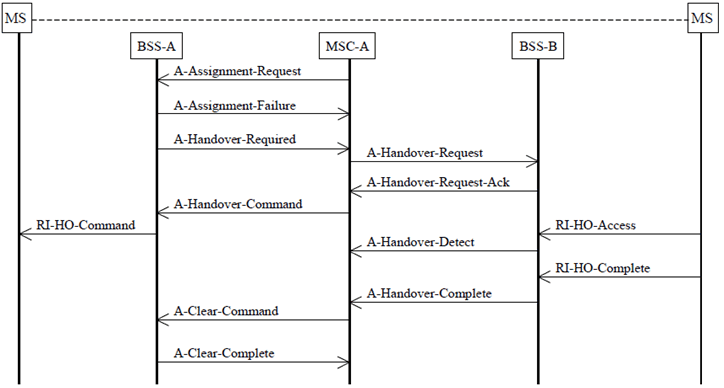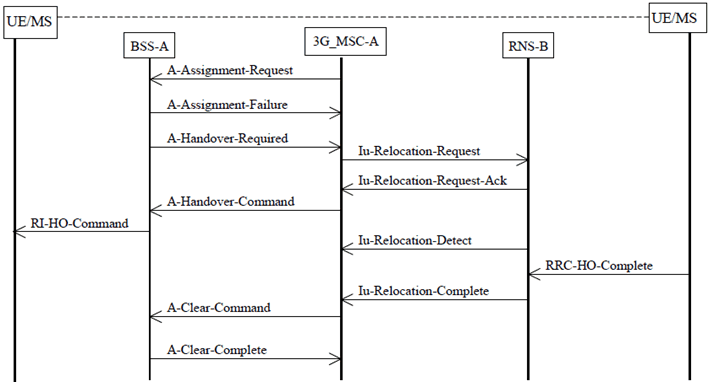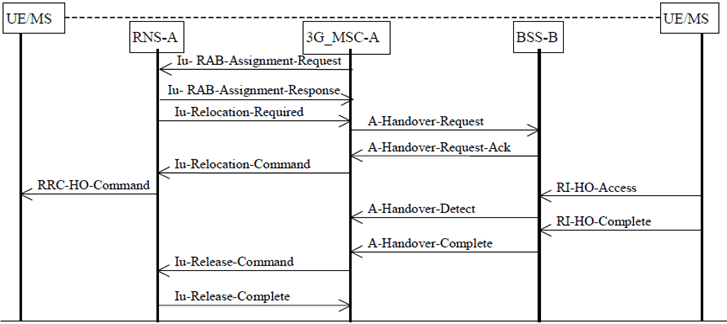Content for TS 23.009 Word version: 18.0.0
1…
4…
4.3…
6…
6.2…
6.2.3
6.3…
7…
7.2…
8…
8.1.3…
8.2…
8.2.2…
8.2.4
8.3…
8.3.2…
9…
10…
11…
12…
12.8…
12.8.2
12.8.3
13…
14…
15…
14 Directed retry handover p. 117
14.1 GSM handover p. 117
The directed retry procedure allows the network to select the optimum cell for the Mobile Station. The process of directed retry involves the assignment of a Mobile Station to a radio channel on a cell other than the serving cell. This process is triggered by the assignment procedures, as described in TS 48.008, and employs internal or external handover procedures as described in clauses 6 and 7. The successful procedure for a directed retry is as shown in Figure 40 and as described below.
If during the assignment phase, as represented by the A-ASSIGNMENT-REQUEST message, a handover becomes necessary, due to either radio conditions or congestion, then the Mobile Station may be handed over to a different cell. When the decision has been made to handover the MS the BSS-A may send an A-ASSIGNMENT-FAILURE message, indicating 'directed retry', before sending the A-HANDOVER-REQUIRED message to MSC-A, indicating 'directed retry'. However BSS-A may alternatively send the A-HANDOVER-REQUIRED message, indicating 'directed retry', without sending the A-ASSIGNMENT-FAILURE message. Other cause values may be used instead of "Directed Retry" in the A-HANDOVER-REQUIRED message, this will allow the MSC to take different actions dependent on the received cause. Upon receipt of the A-HANDOVER-REQUIRED message from BSS-A, then MSC-A shall initiate the handover as described in clauses 6 and 7. No resources shall be cleared in the MSC-A or BSS-A for this connection.
After receipt of the A-HANDOVER-COMPLETE message from BSS-B the assignment procedure shall be considered to be complete and the resources on BSS-A shall be cleared.

If a failure occurs during the handover attempt, for example A-HANDOVER-FAILURE returned from BSS-A or BSS-B, then MSC-A will terminate the handover to BSS-B. Under these conditions MSC-A may optionally take one of a number of actions:
- retry the handover to the same cell;
- select the next cell from the list contained in the A-HANDOVER-REQUIRED message and attempt a handover to the new cell;
- send an A-HANDOVER-REQUIRED-REJECT to BSS-A, if an A-HANDOVER-COMMAND has not already been sent. Additionally MSC-A may retry the assignment procedure to BSS-A;
- retry the assignment procedure to BSS-A, if the failure message was returned from BSS-A. This option is additional to those for normal handover;
- Clear the complete call.
14.2 GSM to UMTS handover p. 118
The directed retry procedure allows the network to select the optimum cell for the UE/MS. The process of directed retry involves the assignment of a UE/MS to a radio channel on a cell other than the serving cell. This process is triggered by the assignment procedures, as described in TS 48.008, and employs internal or external GSM to UMTS handover procedures as described in subclauses 6.2.2 and 8.2. The successful procedure for a directed retry in case of an intra-3G_MSC GSM to UMTS handover is as shown in Figure 40a and as described below.
If during the assignment phase, as represented by the A-ASSIGNMENT-REQUEST message, a GSM to UMTS handover becomes necessary, due to radio conditions, congestion or inability to provide the requested bearer service in GSM, then the UE/MS may be handed over to a UMTS cell. If the requested bearer service cannot be provided in GSM, 3G_MSC-A shall indicate in the A-ASSIGNMENT-REQUEST message that handover to UMTS should be performed. When the decision has been made to handover the UE/MS the BSS-A may send an A-ASSIGNMENT-FAILURE message, indicating 'directed retry', before sending the A-HANDOVER-REQUIRED message to 3G_MSC-A, indicating 'directed retry'. However BSS-A may alternatively send the A-HANDOVER-REQUIRED message, indicating 'directed retry', without sending the A-ASSIGNMENT-FAILURE message. Other cause values may be used instead of "Directed Retry" in the A-HANDOVER-REQUIRED message, this will allow the 3G_MSC to take different actions dependent on the received cause. Upon receipt of the A-HANDOVER-REQUIRED message from BSS-A, then 3G_MSC-A shall initiate the GSM to UMTS handover as described in subclauses 6.2.2 and 8.2. No resources shall be cleared in the 3G_MSC-A or BSS-A for this connection.
After receipt of the Iu-RELOCATION-COMPLETE message from RNS-B the assignment procedure shall be considered to be complete and the resources on BSS-A shall be cleared.

Figure 40a: Example of a Directed Retry Intra-3G_MSC GSM to UMTS Handover Procedure
(⇒ copy of original 3GPP image)
(⇒ copy of original 3GPP image)
If a failure occurs during the handover attempt, for example A-HANDOVER-FAILURE returned from BSS-A or Iu-RELOCATION FAILURE from RNS-B then 3G_MSC-A will terminate the GSM to UMTS handover to RNS-B. Under these conditions 3G_MSC-A may optionally take one of a number of actions:
- send an A-HANDOVER-REQUIRED-REJECT to BSS-A, if an A-HANDOVER-COMMAND has not already been sent. Additionally 3G_MSC-A may retry the assignment procedure to BSS-A;
- retry the assignment procedure to BSS-A, if the failure message was returned from BSS-A. This option is additional to those for normal handover;
- Clear the complete call.
14.3 UMTS to GSM handover p. 120
The directed retry procedure allows the network to select the optimum cell for the UE/MS. The process of directed retry involves the assignment of a UE/MS to a radio channel on a cell other than the serving cell. This process is triggered by the assignment procedures, as described in TS 25.413, and employs UMTS to GSM handover procedures as described in subclauses 6.2.1 and 8.1. The successful procedure for a directed retry in case of an intra-3G_MSC UMTS to GSM handover is as shown in Figure 40b and as described below.
If during the assignment phase, as represented by the Iu-RAB-ASSIGNMENT-REQUEST message, a UMTS to GSM handover becomes necessary, due to either radio conditions. congestion or network preference, then the UE/MS may be handed over to a GSM cell. If the handover to GSM is required due to network preference, 3G_MSC-A shall indicate in the Iu-RAB-ASSIGNMENT-REQUEST message that handover to GSM should be performed. When the decision has been made to handover the UE/MS the RNS-A shall send an Iu-RAB-ASSIGNMENT-RESPONSE message, indicating 'directed retry', before sending the Iu-RELOCATION-REQUIRED message to 3G_MSC-A, indicating 'directed retry'. Other cause values may be used instead of "Directed Retry" in the Iu-RELOCATION-REQUIRED message, this will allow the 3G_MSC to take different actions dependent on the received cause. Upon receipt of the Iu-RELOCATION-REQUIRED message from RNS-A, then 3G_MSC-A shall initiate the UMTS to GSM handover as described in subclauses 6.2.1 and 8.1. No resources shall be cleared in the 3G_MSC-A or RNS-A for this connection.
After receipt of the A-HANDOVER-COMPLETE message from BSS-B the assignment procedure shall be considered to be complete and the resources on RNS-A shall be cleared.

Figure 40b: Example of a Directed Retry Intra-3G_MSC UMTS to GSM Handover Procedure
(⇒ copy of original 3GPP image)
(⇒ copy of original 3GPP image)
If a failure occurs during the handover attempt, for example Iu-RELOCATION FAILURE returned from RNS-A or A-HANDOVER-FAILURE from BSS-B then 3G_MSC-A will terminate the UMTS to GSM handover to BSS-B. Under these conditions 3G_MSC-A may optionally take one of a number of actions:
- send an Iu-RELOCATION-PREPARATION FAILURE to RNS-A, if an Iu-RELOCATION-COMMAND has not already been sent. Additionally 3G_MSC-A may retry the assignment procedure to RNS-A;
- retry the assignment procedure to RNS-A, if the failure message was returned from RNS-A. This option is additional to those for normal handover;
- Clear the complete call.